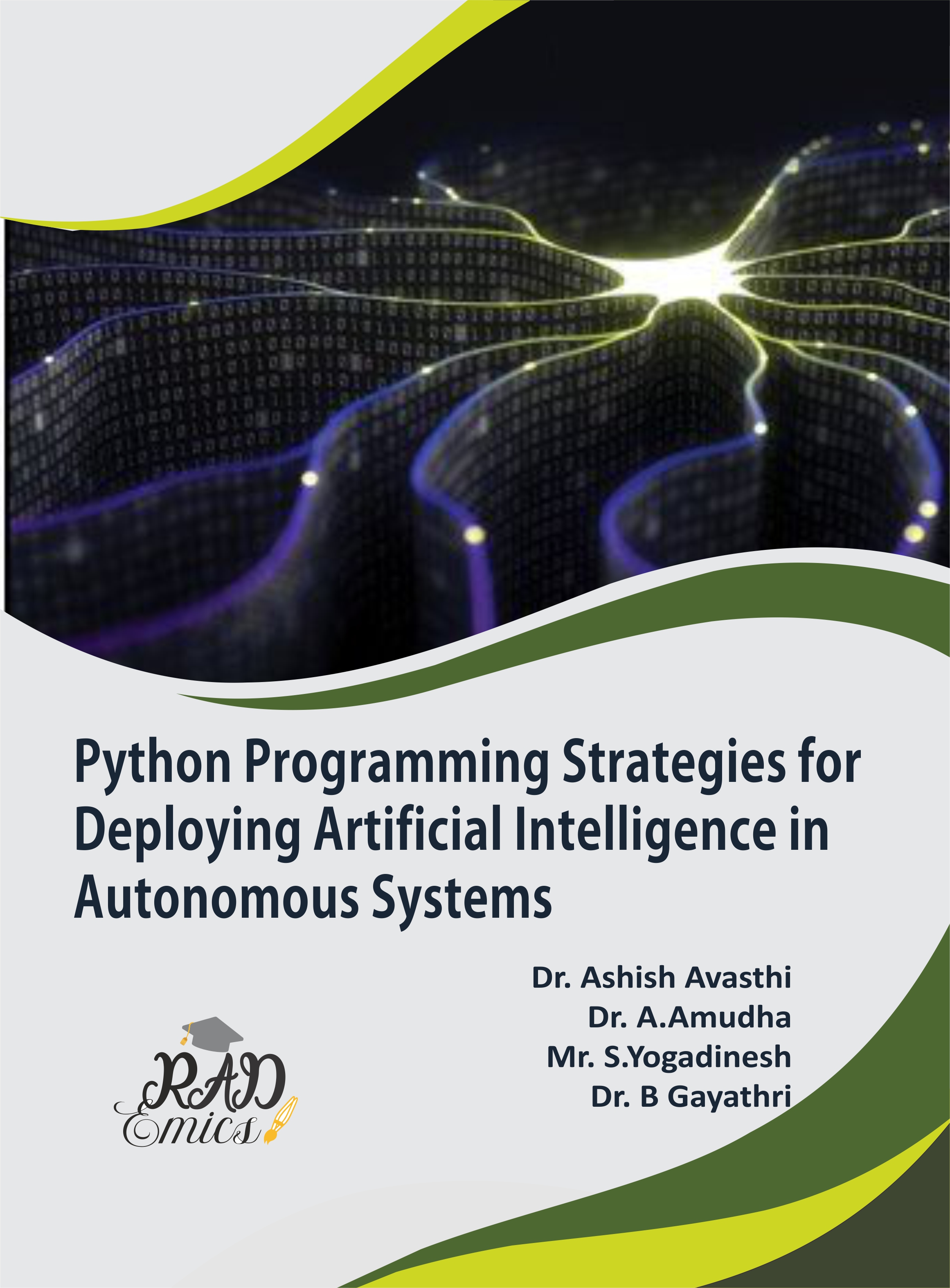
Python Programming Strategies for Deploying Artificial Intelligence in Autonomous Systems
Dr. Ashish Avasthi, Dr. A. Amudha, Prof. S. Yogadinesh, Dr. B. Gayathri
Indexed In: Google Scholar
Release Date: 23/08/2024 | Copyright:© 2024 | Pages: 400
DOI: 10.71443/9788197282140
ISBN10: 8197282145 | ISBN13: 9788197282140
Python Programming Strategies for Deploying Artificial Intelligence in Autonomous Systems offers a comprehensive guide to the integration of AI into autonomous systems using Python. Covering foundational concepts, the book introduces readers to autonomous systems, AI fundamentals, and the role Python plays in AI-driven applications. It delves into Python's core libraries and frameworks for efficient AI development and explores advanced techniques in data collection, preprocessing, machine learning, and deep learning to enhance system intelligence.
Specialized chapters cover reinforcement learning, natural language processing, and computer vision, focusing on how these techniques empower autonomous systems in real-world tasks like navigation, communication, and decision-making. The book also addresses crucial aspects of sensor data fusion, real-time processing, and robust control algorithms. With a focus on simulation, testing, safety, and scalability, this book serves as a practical resource for developing and deploying high-performance autonomous systems using Python.
The goal of this book is to provide readers a thorough grasp of how to use Python to construct and implement artificial intelligence in autonomous systems. It teaches the basic ideas of artificial intelligence (AI) and autonomous systems, with an emphasis on useful Python programming techniques for natural language processing, machine learning, deep learning, reinforcement learning, and data preparation. It also covers real-time processing, the integration of sensor data, and control algorithms tailored to autonomous systems. The book serves developers, researchers, and practitioners of artificial intelligence who want to improve the functionality and efficiency of Python-based autonomous systems by delving into sophisticated approaches in safety, scalability, and system optimization.
Dr. Ashish Avasthi, (MCA,M.Tech, Ph.D) was are resident of Lucknow working in Poornima University, Jaipur Rajasthan India in the department of Computer Science and Engineering. He is interest area in research is Machine Learning, Data Science, IoT and Quatum computing. He went to the thank all his colleagues especially head of department Ms. Shikha Sharma and Dean Dr. Ajay Khunteta. I also want to thank mey beloved wife Anamika and my two son Sparsh and Gopal.
Dr. A. Amudha receiver her B.E degree in computer science from Bharath niketan engineering college,aundipatti,affiliated to anna university ,Chennai india in 2005 and M.E (software engineering) degree from periyar maniammai college of technology for women,vallam,tanjore,and Ph.D. degree from in school of computer science engineering Bharathiyaruniversity,Coimbatore,tamilnadu,india in 2021. Her present research interests include data mining and cloud computing.she has published 7 research papers in reputed international and national journals.she has publishes 5 research papers in international and national conferences. She is currently working as assistant professor at Bharath Niketan Engineering College Theni district,tamilnadu.india.she has been teaching computer related subjects for B.E and M.E computer science engineering.students over period of ten years.She has guided more than 30 students projects at under graduate level.she is life member of indian society of technical education (ISTE).
Prof. S.Yogadinesh is Esteemed Machine learning with a Strong Academic Background. He has significantly contributed to Various Domains including, Networks, Cloud computing, Web development and Artificial intelligence. He is currently working as Assistant Professor in department of Computer Science and Engineering Bharath Niketan Engineering College. He is having 10 years of teaching Experiences in Various Engineering Colleges. He had Authored/Co-authored Numerous Articles Published in science direct Journals. He has published 4 papers in Scopus Index Journals and SCI Journals out of which 3H-index citations and one Patent published at international level.
Dr. B Gayathri is an Associate Professor of Computer Science at Bishop Heber College, serving since 2008. She is distinguished for her expertise in Green Cloud Computing and her dedication to promoting a sustainable environment. She has presented 182 papers, published 31 journals, and authored 5 books. Her remarkable contributions to research and innovation have earned her 38 awards, including International Women Innovator of the Year and Best Researcher. With a robust presence in academic and professional circles, she has attended 175 seminars, conferences, and training programs. Dr. Gayathri is also an Editorial Member and reviewer for esteemed journals, reflecting her significant role in scholarly publishing. Her innovative spirit is demonstrated by 17 filed and published patents, including 2 granted Indian patents, 2 Canadian Copyrights, and 2 UK Design Grant Patents. Additionally, she is actively involved in consultancy work and is a member of 6 professional organizations. Dr. Gayathri has organized 30 seminars, workshops, and conferences, showcasing her leadership in academic events. Beyond academia, she is a renowned guest speaker and poet, with a strong passion for social work.